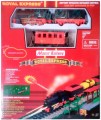Scale
The scale at which the car track or railway is made.
This indicator describes how many times the set items are smaller than real cars or trains; for example, 1:72 means a reduction of 72 times. Accordingly, the larger the number in the denominator, the smaller the scale and the smaller the individual elements of the set will be.
Track style
General railroad style (see "Type")
—
Passenger. Sets that replicate passenger trains - from city trains to high-speed express trains
—
Freight (commodity). Sets that replicate freight (goods) trains. They differ in variety: if on a passenger train the cars have the same design, then on a freight train there may be cars of different types.
-
Retro. Sets replicating vintage trains, often with steam locomotives as locomotives.
-
Children's. Railways designed for younger children. They are made in a characteristic bright design, are distinguished by their simplicity of design, and the tracks often have a specific structure: instead of rails, train wheels roll along furrows-ruts. This device simplifies the installation of “equipment” on the rails and minimizes the likelihood that it will go off the tracks.
Number of carriages
The number of carriages provided for in the railway (see "Type").
The number of carriages is selected taking into account the scale and length of the railway, so that the train does not take up too much space on the tracks. In the most extensive sets, up to ten wagons can be provided. And some manufacturers provide the possibility, if desired, to purchase additional wagons to the existing set.
Track length
The total length of the track of the railway (see "Type").
The
longer the length, the more advanced the set is, the more opportunities for games it gives. On the other hand, a large length directly affects the cost and dimensions.
Number of track details
The number of individual track parts included in the railroad delivery set (see "Type").
Details in this case mean the individual segments that make up the railway. In the most extensive sets, this number can be several dozen. In general, this parameter is mainly for reference, but it also has a practical meaning: the more details, the more “freedom of action” the player has when building a track, the more options for building tracks of various shapes, complexity and duration.
Effects
Additional effects provided in the autotrack or railroad (see "Type").
—
Light. Various lighting effects: headlights of cars and locomotives, taillights of wagons, light in windows, street lights, etc.
—
Sound. Various sound effects: engine roar, horn, wheels clattering at the joints, locomotive “chuffing”, beeps, musical accompaniment, etc.
—
Smoke. Imitation of smoke from a chimney. It is found exclusively in railways, namely in sets with steam locomotives — after all, among locomotives, it is steam locomotives that smoke the most. To create "smoke", a steam generator is usually used, filled with water or a special liquid; such "smoke" is odorless and harmless to others.
Remote control
The presence of a
remote control in the set.
The meaning of this function is generally obvious, we note only one point: do not confuse the remote control with the speed controller (see "Starting the cars"), these are different devices. First, the remote control is usually made wireless; secondly, it is provided mainly in railways, and is rare among autotracks.
Power source
The type of food provided in the kit.
Most kits use classic replaceable batteries of standard sizes — most often AA (“finger”) or AAA (“little finger”), however, in some cases, larger cells like C or D may be required. In addition, there are kits that use several types at once batteries — for example, AA for the movement of a locomotive and AAA for lighting effects in cars.

